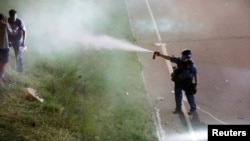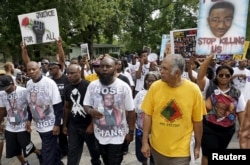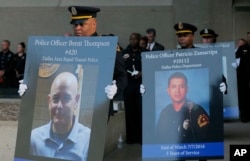When President Barack Obama delivered remarks this week at an interfaith service for the five slain police officers in Dallas, Texas, he tried to soothe a nation jarred by a series of killings of black men by police and a sniper who turned a peaceful protest into a mass shooting.
“I understand how Americans are feeling,” the president said.
“But Dallas I’m here to say, we must reject such despair. I’m here to insist that we are not divided as we seem.”
But a new New York Times/CBS poll about race relations released just one day after Obama's speech suggests a far more bleak picture.
According to the survey, optimism about race among blacks and whites has declined to its lowest level since 1992, when riots erupted in Los Angeles after the acquittals of several police officers who were filmed beating African-American Rodney King. Sixty-nine percent of Americans view race relations negatively. And only 26 percent of those surveyed said relations are mostly good—an 11 point drop from just a year ago.
The poll (conducted over four days and reaching 1,600 adults) also found more than half of black Americans say they were not surprised by the Dallas killings; nearly half of white Americans polled said the same.
On the question of whether or not race relations are improving, the results were just as discouraging. CBS News posted the poll on its website, reporting the joint poll found that just nine percent of Americans think relations are getting better, a notable drop from last year, when 21 percent believed relations were improving.
Obama hosted a nearly four-hour meeting Wednesday at the White House between leaders in law enforcement and prominent members of the black community, afterward saying that "we're not even close to being where we want to be," appearing to contradict the rosier picture he spoke of during his Dallas address.
The gloomy assessment of racial harmony began a steady decline in 2014 following highly publicized incidents between African-Americans and the police such as the shooting of Michael Brown by a white police officer in Ferguson Missouri.
Since then, there have been numerous other violent confrontations with police (not all of them white), culminating in the two back to back episodes the ended with the deaths of African-Americans Philando Castile in Minnesota and Alton Sterling in Louisiana by police last week.
A day after Castile’s girlfriend released her annotated video of the aftermath of his shooting on Facebook, protesters gathered in Dallas and sniper Micah Johnson opened fire on police officers sent to manage the peaceful demonstration.











